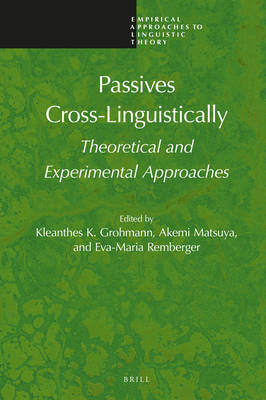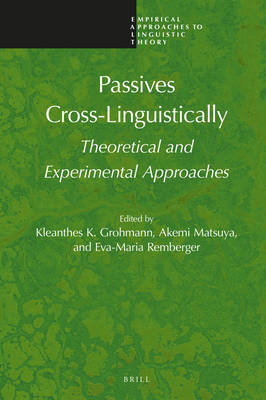
- Afhalen na 1 uur in een winkel met voorraad
- Gratis thuislevering in België vanaf € 30
- Ruim aanbod met 7 miljoen producten
- Afhalen na 1 uur in een winkel met voorraad
- Gratis thuislevering in België vanaf € 30
- Ruim aanbod met 7 miljoen producten
Zoeken
Passives Cross-Linguistically
Theoretical and Experimental Approaches
€ 315,95
+ 631 punten
Omschrijving
The chapters collected in the volume Passives Cross-Linguistically provide analyses of passive constructions across different languages and populations from the interface perspectives between syntax, semantics, and pragmatics. The contributions are, in principle, all based on the background of generative grammatical theory. In addition to the theoretical contributions of the first part of this volume, all solidly built on rich empirical bases, some experimental works are presented, which explore passives from a psycholinguistic perspective based on theoretical insights. The languages/language families covered in the contributions include South Asian languages (Odia/Indo-Aryan and Telugu/Dravidian, but also Kharia/Austro-Asiatic), Japanese, Arabic, English, German, Modern Greek, and several modern Romance varieties (Catalan, Romanian, and especially southern Italian dialects) as well as Vedic Sanskrit and Ancient Greek.
Specificaties
Betrokkenen
- Uitgeverij:
Inhoud
- Aantal bladzijden:
- 454
- Taal:
- Engels
- Reeks:
- Reeksnummer:
- nr. 17
Eigenschappen
- Productcode (EAN):
- 9789004428232
- Verschijningsdatum:
- 4/02/2021
- Uitvoering:
- Hardcover
- Formaat:
- Genaaid
- Afmetingen:
- 155 mm x 235 mm
- Gewicht:
- 879 g

Alleen bij Standaard Boekhandel
+ 631 punten op je klantenkaart van Standaard Boekhandel
Beoordelingen
We publiceren alleen reviews die voldoen aan de voorwaarden voor reviews. Bekijk onze voorwaarden voor reviews.










